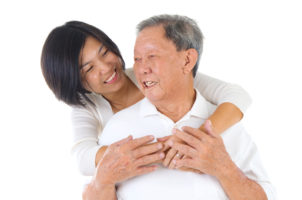While most people associate eating disorders with troubled teens, there are many elderly people that live with them every day. Whether your aging loved one has a history of disordered eating or it’s something that has developed in their senior years, the results are the same—malnutrition and other serious health consequences. Too many family caregivers don’t recognize the signs and symptoms in their elderly loved ones until their health is at risk.

Caregiver Hialeah FL – Does My Elderly Loved One Have an Eating Disorder?
Senior Eating Disorders
Eating disorders at any age are complex, with both physical and mental triggers. The most common eating disorders are anorexia and bulimia. Anorexia is a cycle of starvation that forces the body to slow down and eventually shut down. Consequences include muscle loss, slow heart rate, osteoporosis, fainting, hair loss, dehydration and more.
Bulimia is a binge and purge cycle that is usually done using laxatives in seniors. Physical consequences include irregular bowel movements, ulcers, electrolyte imbalance, high blood pressure, diabetes, heart disease and high cholesterol. Any kind of eating disorder is life threatening, but because seniors are generally less robust than younger victims, it is especially dangerous.
Why Do Seniors Develop Eating Disorders?
Some seniors have struggled with body image issues their whole lives and the disorder is simply coming out of a dormant phase. Other seniors are bothered by bad dentures, side effects of medication, gastrointestinal problems or diminished taste buds that all cause them to lose the desire to eat. Because their caloric expenditures are lower in old age, their body’s demand for calories drops significantly as well.
Eating disorders are generally linked to stress, and seniors certainly experience many different physical and emotional transitions that can become triggers. Common stressors in seniors are death of friends and family, retirement, illness, injury, moving, and fear of death. Depression is also common in seniors and can definitely usher in an eating disorder. Still other seniors turn to controlling their food intake as a way to exercise control over their life in which many things are slipping away. No matter what the trigger, eating disorders among the elderly are common, but they are frequently unnoticed and definitely under diagnosed.
Warning Signs of Elderly Eating Disorders
It’s often difficult to spot the warning signs of eating disorders in aging loved ones because many of them mimic the effects of aging and age-related conditions. Top warning signs include disrupted sleep, hair loss, chapped lips, fainting spells, preoccupation with body image, mood fluctuations, upper respiratory infections and low energy. Eating disorders often accompany depressive episodes as well, so watch for an increase in warning signs following a major trauma or event.
Treating Eating Disorders in Seniors
Because so much of the root causes behind eating disorders are psychological, elderly loved ones will need to see a therapist to start working out a treatment. Family caregivers can focus on providing nutrient-dense food and working with a physician and a nutritionist on any supplements the senior might need. The good news is that recovering from an eating disorder is possible with outside support, so seniors need to get help as soon as possible.
Source: https://www.eatingdisorderhope.com/blog/chronic-illness-and-eating-disorder-development-in-the-elderly-patient
